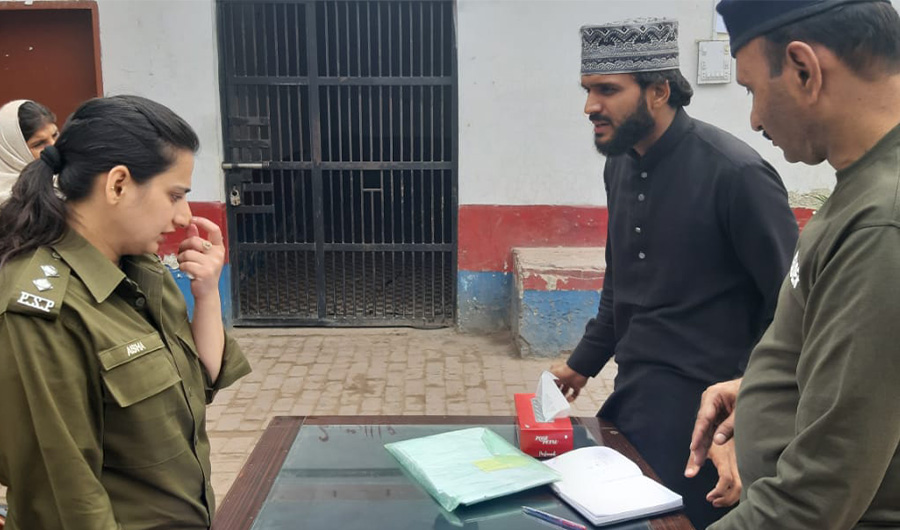KARACHI: Aisha Butt, a young police officer whose photo with her infant daughter went viral on social media last week, told Arab News on Wednesday it was the uniform and certificates of her great grandfather, a policeman, that inspired her to join the force.
“When I passed my Central Superior Services (CSS) examination, I marked police as my second choice on my family’s advice. However, I changed my mind at the last moment since I was deeply inspired by my great grandfather who received plenty of certificates for his immense bravery during the British rule. I also had a special yearning for this uniform. Everyone is now quite happy with the decision in my family,” Butt, who joined the police force in November 2016, said during a telephone interview.
An Assistant Superintendent Police (ASP) who is currently serving in Sheikhupura district of Pakistan’s Punjab province, Butt posted a picture in which she was holding her daughter while working at the police station on Twitter and wrote: “It is difficult but not impossible.”
Over 2000 people retweeted the image and more than 14000 liked it.
“I was not expecting such a warm response from people,” the young police officer told Arab News. “My eight-month-old daughter, Ghaniya Khan, came to meet me when I was listening to people’s complaints in a police station of my sub division.”
She added that the picture showed how women worked in difficult environments.
“But with all these challenges we have proved ourselves to be the best performers of our duties,” she said. “I work in Sheikhupura, my husband, also a cop, is posted in Islamabad. My family is in Gujranwala while my in-laws reside in Karachi. People don’t know in what situation we serve out country while fulfilling our responsibilities at work and toward our families.”

Aisha Butt, while performing her job duties in a Police station in Karachi. (Photo Courtesy: Aisha Butt Twitter Account)
Butt is all praise for the police department and her seniors who, she said, had always encouraged and facilitated women. “They have provided us an enabling environment. They respect our family and children. And they realize that the nature of our job is different and difficult. Policing is a 24-hour job and women, unlike men, have to look after their families as well.”
Asked about the case of a Balochistan lawmaker, Mahjabeen Sheran, who was mocked by her male colleagues for bringing her child to the provincial assembly, Butt said it was a disturbing development.
“But what followed was more encouraging,” she continued. “It gave us a lesson that when you take a step, you face hurdles. But the ultimate result is success. It also shows that we are a progressive society and fast accepting women in bigger and leading roles.”
A few years ago, she added, women passing the CSS exams were not allowed to join the police department. “Today we see many female officers thriving in the police force. They are doing a great job in every section, be it operations division, like SP Suhai Aziz who led from the front during the terrorist attack on the Chinese consulate in Karachi, or the investigation unit. The female commandos and ones in the elite force are setting examples,” she said.
“With women in offices, the attitude of 98 percent people becomes soft. Even when a complainant raises his voice, another one asks him to keep his voice low. The presence of female officers at police stations has also encouraged more women to trust the force with their problems,” the ASP said.
She pointed out that there was no sense in keeping 50 percent of the country’s population underutilized, adding that the media should play a role in creating that awareness in Pakistan.
“But the main responsibility,” she continued, “rested with women who have got good positions. By becoming role models, they can encourage more women to join different fields for the sake of their country, their society and children.”
Butt also urged the government to induct more women in different professions.
“In order to encourage more women to do their job, the government should set up daycare centers in every town. These centers should not only be operational for 24 hours but must have good staff and all the other required facilities,” she said.
Asked if she had a message for young girls, Butt said: “Make excellence, not gender, your identity. Don’t burden other people, and don’t let them be a burden on you.”












